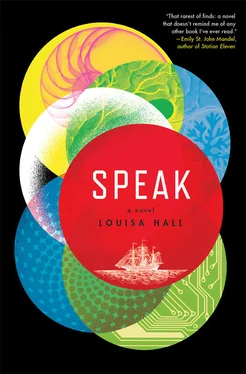(5) The Diary of Mary Bradford
1663
ed. Ruth Dettman
30th . Night, and the last day of the month. Foul weather. Choppy seas, dark skies. Ralph very sick. Vomited twice more this morning. Have been reading to him from The Caelestiall Orbes . Have now an increased understanding of the Copernican system, it being a startling fearful new science. Earth no longer fixed, as was previously thought to be true; instead, earth moves in circles through heavens. Loss of place in universe, and no crystal spheres. No center. No fixed order of planets. Only perpetual motion. Sun fixed, possibly, but everything else spinning about. Constant circling, and our earth a great ship that shall never arrive.
Above, great unhealthy gales, and there being occasional shouts, seamen crying out to each other. Each voice isolated from whatever reply. Planet unmoored. Must cling to Ralph, if we are to eternally spin, battered by winds, in firmament that is liquid and black, and knowing that we were once home but never will be again.
May 1st . Storm rages. There is a chance that ship shall be lost.
I remain in my cabin, full of compunction for sins. Have been contumacious daughter to troubled father, dishonest in all wedding vows, and conceited and overweening with servants. Have indulged in self-pity. Have scorned mother who bore me. Do not remember that ever my heart was so apprehensive of parents’ well-being. Have fear upon me that I should scarce see them again.
Whole ship shakes. Seems likely to be torn to shreds by the waves, each rib scattered over the ocean. Only wish to make my amends. Have attempted to venture out to parents’ cabin, but immediately stumbled. Hallway unfolds at unhealthy angle and seethes with black sluicing streams. Fallen, did slide downwards along hallway, and the ceiling tilting at me so I grasped at doors as I passed them. Might have slid down the stairs and so perhaps out to sea had I not encountered ship’s boy, who seems to have been keeping watch. Called himself E. Watts. Him helping me right myself, and I, cringing in shame for such weakness, was assisted back to my door. Enjoined to keep my cabin, it being not safe to move about. Commanded to look after my dog.
Am therefore forced to harbor remorse until after tempest has settled. Great desire for public confession, though God help me if this make me impious. Have little desire to confess sins in private, for God must know my deepest remorse. A different matter entirely if father should be swept out to sea, and him still unknowing my gratitude and affection.
In want of comfort, have been reading my Bible. Ralph listens, and his ears shifting. In truth, admit to finding little comfort in Bible, there being such a great number of tempests. Paul alone exposed to not one but three near-fatal shipwrecks. Seems ill-advised for him to have set sail after the second. First time not his fault. Second and subsequent were, he being not a lucky man on the ocean. Many biblical people lost to violent seas, except Paul. All die but Paul, who continues to adventure.
Understand, at this point, awful affliction of dying at sea. Nothing stable remaining, and then to be left behind unremembered. Can now comprehend Shakespeare’s Gonzalo. Now I would give a thousand furlongs of sea for an acre of barren ground. I would die a dry death.
2nd . Have passed a most wretched night, and our cabin black as a tomb. Slept only in fits, woken by a great shuddering crack, and the sound of cries and lashed rigging. Ralph whines, covers nose with both paws. Does not like to show me his face, it being I who brought him from safety to this place of stern judgment.
I have made terrible errors. Have been intemperate, cruel to my parents, greedy for things too much beloved. Did not acknowledge E. Watts until he had saved me from gales. Have wanted too much to return, and erred, methinks, most gravely in bringing Ralph here, to this cabin in the whale’s belly.
3rd, methinks, though no longer certain. Still we are threatened with shipwreck. Have seen no one but Watts, and just now my husband, him having labored out through bad weather, bringing sustenance to our cabin. Stood at our threshold, but would not come in uninvited. Author took from him hardtack, salt horse, some cheese, and a large flask. Brine nearly up to his knees. Had thanked him, and was thinking to ask him in, for we have spent these days exceeding alone, but noticed him looking strangely at Ralph. Did then remember old anger, and unhappy wedding, and Whittier speaking ill of mere beasts. Supplied him then a haughty expression that did send him away.
After, and alone again in our cabin, unable to eat for remorse. Fed salt horse to Ralph, but he would not take it. Wishes only to lie with his head fully hidden. Poor Ralph, and I much stricken by regret to have treated Whittier badly, and now to be eating the cheese that he brought.
3rd . Later. Surely now it is night, and the hours grow monstrous. Storm appears to become worse, and water seeping through timbers. Heart exceeding heavy for mother and father. Spoke to them last in anger. Have tried to sleep but cannot. Only comfort in shape of Ralph’s body, curled here at my side.
Sweet head. Familiar knob of his skull, white down on his chin. Flat temples. Surely there is goodness and light, but only wish to send letter to father, carrying a full-enough weight of my thanks.
(1) The Memoirs of Stephen R. Chinn: Chapter 4
Texas State Correctional Institution, Texarkana; August 2040
As you know, and counted against me at trial, my algorithm worked beyond my most hopeful predictions. Time after time, the women returned. We talked. Involved, we spiraled past banalities, pressing outward until the intensity of the conversation reached such a threshold that my conversational partner was forced to call the end of the fight. By which I mean she would kiss me. Reach down to take my creaturely paw. Lead me out to a car, drive me back to a house, pull me into bed if not because I was handsome or charming then because she was compelled to halt the intensification of a conversation that had expanded past conventional limits.
Throughout all this time, I didn’t consider my own feelings much, nor did I consider the feelings of the people I slept with. I don’t say this pridefully, but because it behooves me now to be honest: the endless lights-out is made worse by a conscience. I never treated my targets with deliberate unkindness, but the fact of the matter is that I don’t remember most of their names, and for the most part I left them without regard for their feelings. All I could see was the great challenge of my life — cherished so long, in so many dark hours — and its ultimate accomplishment. Moral subtleties were not on my mind when I left my lovers behind, or when I wrote The Seduction Equation .
Which brings us up to my greatest crime, or the greatest crime in that stage of my life. Once the book had been written and read — and it was read, by the millions, in every possible language — each member of a barstool conversation knew where he or she would go in advance. The first ten terms were pre-wrought. Memorized. It was like the book portion of chess, learned in advance, repeated ad nauseam until someone — many moves down the line — finally finds the courage to go off-book. As the book ruined chess, Stephen Chinn’s Seduction Equation destroyed the art of conversation.
During this period, I’d walk into bars and recognize everywhere the mechanical cricket orchestra of my blasted formula. Everyone was using it. When I zeroed in on a woman, she zeroed in on me. Curiosity was replaced with routine. We both scrambled to get the interrogatory role, which took less effort in the end. Once the roles were decided, we slipped into our conversation as easily and uncomfortably as one slips into a lukewarm, secondhand bath. Later, we slunk back to the sheets with the dull resignation of a pair of generals who know in advance that both sides will indubitably lose.
Читать дальше












